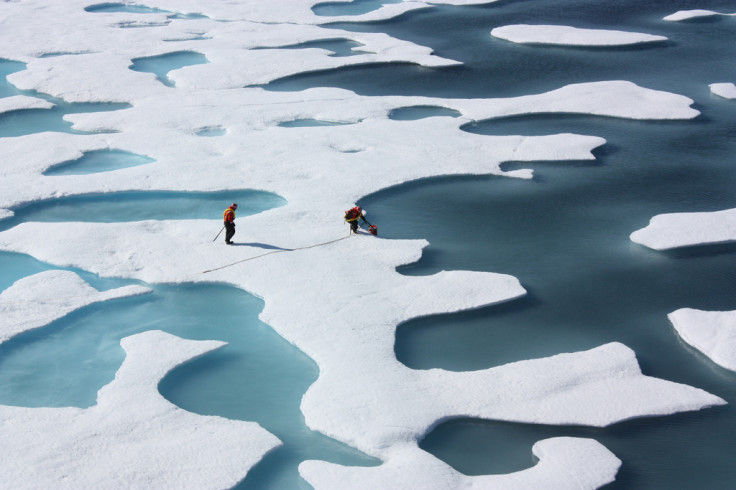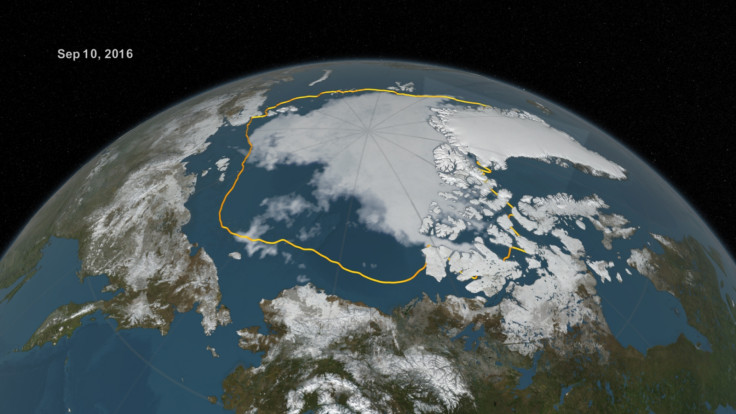When will the Arctic be ice-free? 2C global warming would not prevent complete loss
Limiting climate change to 2C warming still would not stop the Arctic ice from melting away.
The Arctic will be ice-free by the middle of the century if nothing is done to curb global warming, scientists have warned. What's more, they said even limiting it to 2C above pre-industrial levels would not be enough to stop Arctic sea ice from disappearing.
James A Screen and Daniel Williamson, mathematicians at the University of Exeter, were looking at different climate models to create a statistical analysis of if and when we will see an ice-free Arctic under different conditions.
Writing in an opinion piece in the journal Nature, the researchers note that an "ice-free" Arctic would be the point at which sea-ice extent falls below one million km sq. This would be recorded in September, at the end of summer, when sea ice levels are lowest.
The threshold is not zero as some ice would remain on the coasts of Greenland and Ellesmere long after most of the Arctic has turned to water. "Without efforts to slow man-made global warming, an ice-free Arctic would likely occur in summer by the middle of this century," they wrote. "But would limiting warming to 1.5C, or even 2C, prevent the Arctic ever going ice-free?"
They said disparities between different climate models can be accounted for mathematically, using data from the average amount of sea ice between 2007 and 2016.

"Using the observed sea-ice extent for the last decade (4.8 million/km2) as a predictor in our simple regression models yields an observationally constrained prediction of 2.9 million km sq for the minimum sea-ice extent if global warming is limited to 1.5C, or 1.2 million km sq if global warming remains below 2C."
If warming is kept within 1.5C, which was the target set out in the Paris Agreement at COP21, there is less than a one in 100,000 chance of an ice-free Arctic. However, if warming reaches 2C, then there is a 39% chance of the ice disappearing.
"We suppose then that a summer ice-free Arctic is virtually certain to be avoided if the 1.5C target of the Paris Agreement is met," they wrote. "However, the 2C target may be insufficient to prevent an ice-free Arctic. Furthermore, our analysis suggests that the Nationally Determined Contributions submitted by countries to support the Paris Agreement (which imply warming of around 3C) would likely lead to the Arctic becoming ice-free."
Screen told IBTimes UK: "The model experiments we used ran until 2100. All model experiments we analysed (except for one, I think) reached 2C before 2100. If we take a simple average of the model experiments, they suggest the 1.5C threshold will be passed around year 2026 and the 2C threshold around 2043.
"Obviously the timing of an ice-free Arctic will depend to a large degree on what our greenhouse gas emissions are between now and then. This is why we decided to present the analysis in terms of the amount of warming (which is relatively insensitive to the pathway we take to get there) rather than in terms of a year (which depends a lot on what our future emissions will be).
"We did, however, conduct a similar analysis where we constrained the models by the available observations and came up with a best estimate for the timing of an ice-free Arctic. This gave a timing of around 2030-40 (using the RCP8.5 scenario, which assumes business-as-usual, i.e., a continuing increase in CO2 over coming decades)."

An ice-free Arctic would have huge global consequences. It has the potential to trigger major changes to ocean circulation, weather patterns and ecosystems across the world.
Screen said: "I wouldn't say an ice-free Arctic is inevitable, but to have a good chance of avoiding an ice-free Arctic there needs to be rapid efforts to reduce global warming. In my opinion it is almost certain that we will pass 1.5C. The measures required to prevent this seem too far removed from current and planned mitigation efforts. I think staying below 2C is possible, but will require much stronger mitigation efforts than are currently on the table.
"The consequences of an ice-free Arctic are many and diverse. It threatens wildlife and traditional ways of life in the Arctic. It also has knock-on effects on weather and climate outside the Arctic. It will open up the possibilities of increased shipping and industry in the Arctic, will potential benefits and costs."
© Copyright IBTimes 2025. All rights reserved.






















